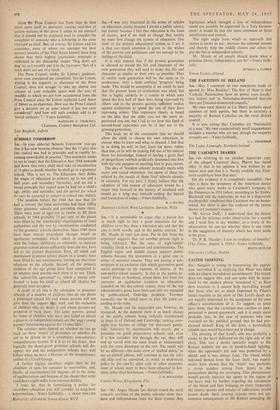qCHOOLS TOMORROW SIR,—In your editorial 'Schools Tomorrow' you say that
it has now become obvious 'that the 11-plus. idea [my italics] was bad in principle and is rapidly be- coming unworkable in practice.' This statement seems to me to imply that the Education Acts 1944 onwards laid down that every child shall take an examination at 11-plus to decide whether he shall go to a grammar school. This is not so. The Education Acts define tbe stages of education as primary up to ten and a half years and secondary thereafter, and set out a broad principle that regard must be had for a child's age, ability and aptitudes, and the period for which he may be expected to remain at school (my italics).
The position before the 1944 Act was that for half a century the local authorities had bean aiding many grammar schools and providing many more. There were tests at ages ten to twelve to fill these schools. In 1944 probably 70 per cent. of the places were filled by the 'scholarship' examinations of local authorities and the rest by examinations conducted by the grammar schools themselves. Since 1944 there have been certain procedural changes based on egalitarian principles which, taken in conjunction with the failure, deliberate or otherwise, to increase grammar-school places sufficiently since the war, have led to the present discontent. First, all aided and maintained grammar-school places in a county have been filled by one examination, leaving no discretion whatever to the schools. Second, all the primary children of the age group have been compelled to sit whether their parents wish them to or not. Third, the 'school-life agreement' by which a parent con- tracted to keep his child at school till 16-plus has generally been scrapped.
A result of all this is the admission to grammar schools of a number of children who do not desire a prolonged school life and whose parents will not give them the support they need, and the exclusion of children who do desire it and whose parents are prepared to back them. The latter parents, joined by those of children who have just failed to obtain a place in an independent school, arc the 'angry young parents' fulminating against the '1 1-plus idea.'
The solution must depend on whether we can go back on these 'errors' of procedure or whether we are to be driven on to a completely non-selective, comprehensive system. If it is to be the latter, then logically the direct-grant grammar schools will dis- appear too and the independent schools may well follow when we have a Premier of the revolutionary calibre of a Lloyd George.
A further logical corollary might then be the abolition of tests for entrance to universities, and, finally, of examinations for degrees, all in the name of egalitarianism and because of the shame that some candidates might suffer from nervous debility.
I trust, Sir, that in formulating a policy for secondary education you will consider its long-term repercussions.—Yours faithfully, J, HOOD PHILLIPS University of London, Senate House, WCI






























 Previous page
Previous page